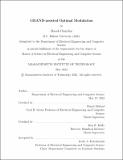GRAND-assisted Optimal Modulation
Author(s)
Ozaydin, Basak
DownloadThesis PDF (2.055Mb)
Advisor
Médard, Muriel
Duffy, Ken R.
Terms of use
Metadata
Show full item recordAbstract
For Gaussian channels with peak and average power constraints the optimal modulation (OM) schemes are known to have nonuniform probability distributions over the signal points. An established way to obtain these distributions is assigning different number of bits to different constellation points. However, this method leads to challenges in demodulation as if a symbol is identified falsely, due to the different bit lengths of symbols, bit insertions or deletions may occur which may in return cause error propagation. Hence, the difficulty of realizing the channel optimal distributions on constellation signals impeded OM from becoming widely utilized in communication systems. In this thesis, we propose a practical system for OM that uses only a simple padding scheme instead of the complex mechanisms in the current literature. A guess-based error correction demodulator lies at the core of the proposed system. Together with the padding scheme of our choice, our novel light-weight variant of Guessing Random Additive Noise Decoding (GRAND) demodulator protects the system against insertions and deletions. We display that with our approach an overall gain of up to 2 dB in energy per bit over noise spectral density (𝐸𝑏/𝑁0) is achievable compared to Quadrature Amplitude Modulation (QAM) with the same number of points.
Date issued
2022-05Department
Massachusetts Institute of Technology. Department of Electrical Engineering and Computer SciencePublisher
Massachusetts Institute of Technology